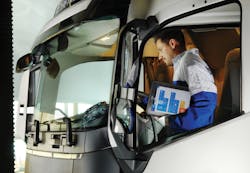In recent years, scan tools have quickly become a more and more important tool for shops and technicians to own.
“All scan tools do a certain set of things that are exactly the same if they have the coverage. They will give you a code, its status, and a general description of what it means,” says Bruno Gattamorta, vice president of sales and marketing at Cojali USA.
Though it’s important to understand that “certain set of things” all scan tools do, having a general understanding of the significance of scan tools, their unique features, and what is up and coming is crucial as well.
The importance of scan tools
With all the advances in vehicle technology, what’s under the hood has transformed. Just about every part of the vehicle has a computer and is touched by OBD related diagnostics in some way, cementing the necessity for technicians to own at least one, if not multiple, scan tools.
In the past, things were different – a technician could get away with using their wrench and a little elbow grease to repair vehicles. Nowadays, just about every job – ranging from simple maintenance procedures to advanced calibrations – calls for the use of a scan tool.
“Technicians need scan tools like they need air,” says Harlan Siegel, vice president, diagnostics at Launch Tech USA. “Everything in that vehicle today involves a scan tool to validate its operation, its initialization, or calibration. Period. That’s why today, shops have a need for multiple scan tools.”
Shops owners who acquire and use scan tools at their shop might even find they can increase their revenue. Scan tools give shops the ability to work on a greater variety of vehicles; many scan tools have features which provide repair information for various makes and models, including domestic, European, and Asian. Without scan tools in their arsenal, shops may have to send business away.
Technicians need to understand what the problem is before getting to work on a vehicle. Chad Schnitz, national sales manager - strategic accounts, Autel North America, explains, “It’s all about time and information for the technician. The more data [provided] from the vehicle, the more active tests [technicians] can perform, and [the] more coding, adaption, [and] module syncs [they] can do in the shop, the more profitable the shop and technician will be.”
The more a technician knows, the better they can repair all the issues presented in that vehicle. Scan tools provide technicians the opportunity to find and correct a greater range of problems.
Tips for selling
When it comes to selling scan tools you don’t have to be an expert, but Cojali’s Gattamorta does advise knowing the basics: the tool’s coverage, usability, and return on investment (ROI). Knowing anything beyond this is great, but if a customer asks a question you just don’t have the answer to, do your best to find that answer for them or point them in the direction of someone who can answer their question.
Many companies offer some kind of customer service resource – such as classes, webinars, videos, or simple documents answering the most frequently asked questions.
“As one of our top salesmen says, ‘When we educate, we sell,’” Gattamorta says.
In order to make the sale, you have to know what your customer is looking for in a scan tool. That means asking questions. Autel’s Schnitz offers a list of potential questions to ask customers so you can help them find the right scan tool.
- What vehicles do you work on?
- Do you currently do J-2534 programming?
- Do you want to do J-2534 programming?
- Do you have a TPMS tool?
- Do you have the need to program keys?
- What is your budget?
Asking the right questions means helping your customers find the right tool for their shop while saving them from overpaying for features they potentially wouldn’t have used.
Additionally, having the scan tool out and available for demos is crucial. Technicians want to be able to give the tool a try, see what features there are, see how user-friendly it is, and then make their decision on whether to buy. Schnitz does caution, though, that when doing a live demo, you should plug it into your own truck, otherwise you’re at the risk of them plugging into a truck the scan tool may not know how to fix.
Something else to keep in mind while trying to make the sale are the costs technicians and shop owners will have outside of paying for the scan tool itself.
“[For] a good gauge of ROI, shop owners [should] consider the overall cost of ownership for not only their scan tools and software update costs, but the costs for access to repair information like ALLDATA, Mitchell 1, Identifx, et cetera. Between diagnostic subscriptions averaging $1,000 per year, and repair information costing about $1,800 per year, the multitude of subscriptions can really add up,” says Danijela Haskin, product manager, diagnostics, at Bosch Automotive Service Solutions.
This is why it’s so important to get an understanding of what your customers need and want from a scan tool, so you can give them the best deal on the right fit for their shop.
The future of scan tools
As vehicle technology advances, so must scan tool technology.
“Scan tool technology is trending to become more of an overall diagnostic resource for technicians,” says Bosch's Haskin. “Solely reading codes, live data, and tests isn’t going to cut it – that’s just the first step. The more information available to technicians the better, and the ability to have everything needed to diagnose, research, and repair vehicle issues at their fingertips is taking them to the next level.”
It is possible that technicians may run into some difficulties in the future, as it is becoming more likely OE manufacturers will increase security and encryption on their vehicles. According to Autel’s Schnitz, encrypted CAN networks may be put in place which will not allow users access to the network. This block could be troublesome as almost every repair done nowadays relies on the information provided by scan tools.
The future of scan tools isn’t at all bleak; with features like intelligent vehicle storage technicians will have a stockpile of information on the vehicles they are repairing, allowing them to see the last codes and information a vehicle stored, explains Launch Tech’s Siegel.
“It’s really critical,” he says. It’s like if you went to a doctor and they were able to go to a portal where they could look up all your information from your other doctors, allowing them to make a diagnosis centered around your medical history. The same goes for intelligent vehicle storage; it gives technicians access to a vehicle’s history, so they have a complete understanding of how best to repair that vehicle.
Another feature to look forward to is predicted failures from remote diagnostics. “This kind of technology avoids downtimes and improves processes,” says Dario Peruch, general manager at TEXA USA Inc. Knowing in advance what problems a vehicle may face allows shop owners and techs to keep an eye on those issues or put preventative measures in place.
Scan tools are a must for today’s and tomorrow’s repairs. Boost sales by having a conversation with prospective buyers about how scan tools are necessary for a productive and profitable shop.


